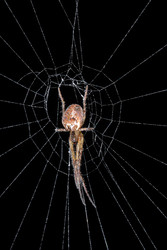Nanometa clade
Dimitar Dimitrov and Gustavo Hormiga


This tree diagram shows the relationships between several groups of organisms.
The root of the current tree connects the organisms featured in this tree to their containing group and the rest of the Tree of Life. The basal branching point in the tree represents the ancestor of the other groups in the tree. This ancestor diversified over time into several descendent subgroups, which are represented as internal nodes and terminal taxa to the right.

You can click on the root to travel down the Tree of Life all the way to the root of all Life, and you can click on the names of descendent subgroups to travel up the Tree of Life all the way to individual species.
For more information on ToL tree formatting, please see Interpreting the Tree or Classification. To learn more about phylogenetic trees, please visit our Phylogenetic Biology pages.
close boxIntroduction
The ‘‘Nanometa clade’’ is an Australian lineage that includes the genus Nanometa, some species currently classified as Orsinome and an undescribed genus. Very little is known about the biology and diversity of this group.
Characteristics
Spiders from the ‘‘Nanometa clade’’ have numerous unique characteristics that make them easy to distinguish from other tetragnathids. ‘‘Nanometa clade’’ members have ramified median tracheae (with a branching pattern very different from that of the tetragnathine genus Glenognatha). Females have cheliceral denticles between the anterior and posterior rows of cheliceral teeth. Males have stridulatory ridges on the book-lung plates and small denticles on the fourth coxae's mesal surface.
Discussion of Phylogenetic Relationships
Forster and Forster (1999) placed the genus Nanometa and the species Orsinome lagenifera in a separate family, Nanometidae, but they did not provide a explicit justification for their proposed new family. All phylogenetic analyses that have included Nanometa found it deeply nested within Tetragnathidae, which would of course render this latter family paraphyletic (Álvarez-Padilla, 2007; Álvarez-Padilla et al., 2009; Dimitrov and Hormiga, 2009). Nanometa and Orsinome sarasini are treated as a lineage under the informal name ‘‘Nanometa clade’’. The genus Orsinome is not monophyletic and the species Orsinome sarasini is not congeneric with the leucaugine Orsinome vethi (the type species). At present time it is not possible to ascertain how many of the species included in Orsinome are actually members of the ‘‘Nanometa clade.’’ The tree presented here is taken from Álvarez-Padilla et al. (2009).
References
Álvarez-Padilla F., Dimitrov D., Giribet G., Hormiga G. 2009. Phylogenetic relationships of the spider family Tetragnathidae (Araneae, Araneoidea) based on morphological and DNA sequence data. Cladistics (In press).
Álvarez-Padilla F. 2007. Systematics of the spider genus Metabus O. P.-Cambridge, 1899 (Araneoidea: Tetragnathidae) with additions to the tetragnathid fauna of Chile and comments on the phylogeny of Tetragnathidae. Zool. J. Linn. Soc. 150: 285–335.
Dimitrov D., Hormiga G. 2009. Revision and cladistic analysis of the orbweaving spider genus Cyrtognatha Keyserling, 1881 (Araneae, Tetragnathidae). Bulletin of the American Museum of Natural History 317: 1-139.
Forster R.R., Forster L. 1999. Spiders of New Zealand and their Worldwide Kin. University of Otago Press, Dunedin, NZ.
Title Illustrations

| Scientific Name | Undescribed Nanometa clade species |
|---|---|
| Location | Australia |
| Specimen Condition | Live Specimen |
| Identified By | Dimitar Dimtirov |
| Image Use |
 This media file is licensed under the Creative Commons Attribution-NonCommercial License - Version 3.0. This media file is licensed under the Creative Commons Attribution-NonCommercial License - Version 3.0.
|
| Copyright |
© 2006 Gustavo Hormiga

|
About This Page
Dimitar Dimitrov

Zoological Museum, University of Copenhagen
Gustavo Hormiga

George Washington University, Washington, D. C., USA
Correspondence regarding this page should be directed to Dimitar Dimitrov at and Gustavo Hormiga at
Page copyright © 2009 Dimitar Dimitrov and Gustavo Hormiga
 Page: Tree of Life
Nanometa clade.
Authored by
Dimitar Dimitrov and Gustavo Hormiga.
The TEXT of this page is licensed under the
Creative Commons Attribution-NonCommercial License - Version 3.0. Note that images and other media
featured on this page are each governed by their own license, and they may or may not be available
for reuse. Click on an image or a media link to access the media data window, which provides the
relevant licensing information. For the general terms and conditions of ToL material reuse and
redistribution, please see the Tree of Life Copyright
Policies.
Page: Tree of Life
Nanometa clade.
Authored by
Dimitar Dimitrov and Gustavo Hormiga.
The TEXT of this page is licensed under the
Creative Commons Attribution-NonCommercial License - Version 3.0. Note that images and other media
featured on this page are each governed by their own license, and they may or may not be available
for reuse. Click on an image or a media link to access the media data window, which provides the
relevant licensing information. For the general terms and conditions of ToL material reuse and
redistribution, please see the Tree of Life Copyright
Policies.
- First online 09 March 2009
- Content changed 09 March 2009
Citing this page:
Dimitrov, Dimitar and Gustavo Hormiga. 2009. Nanometa clade. Version 09 March 2009 (under construction). http://tolweb.org/Nanometa_clade/134637/2009.03.09 in The Tree of Life Web Project, http://tolweb.org/







 Go to quick links
Go to quick search
Go to navigation for this section of the ToL site
Go to detailed links for the ToL site
Go to quick links
Go to quick search
Go to navigation for this section of the ToL site
Go to detailed links for the ToL site